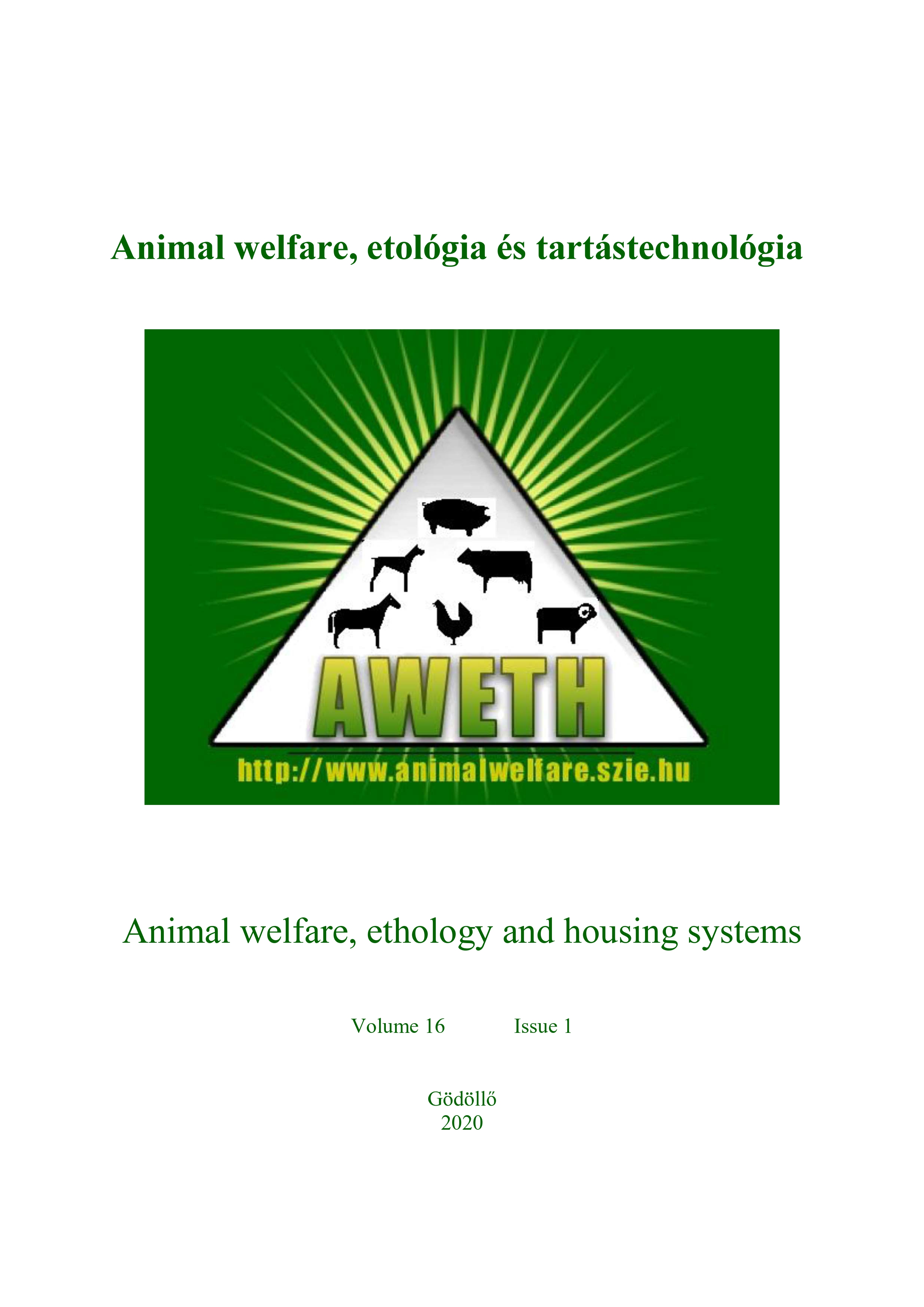Effect of environment enrichment to aggressive behaviour in piglets
DOI:
https://doi.org/10.17205/SZIE.AWETH.2020.1.022Schlagwörter:
environmental enrichment, aggression, behavior, pigAbstract
Aim of the paper was to evaluate the effect of various types of environment enrichment to aggressive behavior in piglets. Two types of pen were involved in tests - the pen with concrete floor cowered by straw (CFS) and the pen with slatted floor (SF). The CFS pen was enriched by temporary dividing to two parts by barrier with gap stuffed by straw (CFSD). Barrier was placed to the pen before shifting and mingling litters, two litters were placed each to another side. The gap was cleared from straw by the piglets during the pen exploration and mingling was unforced. The SF pen was enriched by plastic tube (SFT), PET bottle (SFB) and with anise smell (SFS). The number of attacks during 1st hour after shifting (NA1H) and total number of attacks during 8 hours after shifting to the new pen (TNA) and mean of attacks per 20 minutes intervals (MA20) have been evaluated. The CFSD modification significantly decreased MA20 (P < 0.001), TNA and NA1H were decreased too, difference was not significant. Modifications of SF pen had no significant effect. SFT led to decrease NA1H, TNA and MA20 were increased. SFS and SFB led to increasing all evaluated traits. The most effective seem to be space modification (CFSD). Moreover, Spearman correlation showed importance of space allocation per piglet. Higher space allowance leads to decrease of aggressive behavior -area per pig negatively correlated with NA1H (-4.19, P > 0.05), TNA and MA20 (ρ = -0.636, P < 0.05).
Literaturhinweise
Amstutz, M., Bennett-Wimbush, K., Meek, T., Courtney, S. (2005): Effects of Acclimate™ on the frequency and duration of aggressive sequence and growth performance in co-mingled, weaned pigs. Livestock Production Science, 95. 3. 243–246. https://doi.org/10.1016/j.livprodsci.2005.01.004
Averós, X., Brossard, L., Dourmad, J., de Greef, Edge, H. L., Edwards, S. A., Meunier-Salaün M. (2010): A meta-analysis of the combined effect of housing and environmental enrichment characteristics on the behaviour and performance of pigs. Applied Animal Behaviour Science, 127. 3-4. 73–85. https://doi.org/10.1016/j.applanim.2010.09.010
Ayo, J., O., Oladele, S, B., Fayomi, A. (1998): Stress and its adverse effects on modern swine production. Pig news and information, 19. 2. 51–56.
Bolt, S. L., George, A. J. (2019): The use of environmental enrichment on farms benefits animal welfare and productivity. Livestock, 24. 4. 183–188. https://doi.org/10.12968/live.2019.24.4.183
Buijs, S., Muns, R. (2019): A Review of the Effects of Non-Straw Enrichment on Tail Biting in Pigs. Animals, 9. 10. 824–827. https://doi.org/10.3390/ani9100824
Christinson, G. I. (1996): Dim light does not reduce fighting or wounding of newly mixed pigs at weaning. Canadian Journal Animal Science, 76, 141–143. https://doi.org/10.4141/cjas96-019
Clark, C. C. A., D'Eath, R. B. (2013): Age over experience: Consistency of aggression and mounting behaviour in male and female pigs. Applied Animal Behaviour Science, 147. 1-2. 81–93. https://doi.org/10.1016/j.applanim.2013.04.014
Dechamps, P., Nicks, B. (1989): Effets de la lumière en élevage porcin. Annales de Médecine. Véterinare, 133, 313–320.
FASS (2010): Guide for the Care and Use of Agricultural Animals in Research and Teaching. 3rd edition. Available at https://www.umass.edu/research/sites/default/files/documents/ ag_guide_3rd_ed.pdf Accessed 13. 11. 2019
Hessel, E. F., Reiners, K., Van den Weghe, H. F. A. (2006): Socializing piglets before weaning: Effects on behavior of lactating sows, pre- and postweaning behavior, and performance of piglets. Journal of Animal Science, 84. 10. 2847–2855. https://doi.org/10.2527/jas.2005-606
Ishiwata, T., Uetake, K., Tanaka, T. (2002): Factors affecting agonistic interactions of pigs after regrouping in pens with a box. Animal Science Journal, 73. 5. 409–415. https://doi.org/10.1046/j.1344-3941.2002.00057.x
Olesen L. S., Nygaard, Ch. M., Friend, T. H., Bushong, D., Knabe, D. A., Vestergaard, K. S., Vaughan, R. K. (1996): Effect of partitioning pens on aggresive behaviour of pigs regrouped at weaning. Aplied Animal Behaviour Science, 46. 3-4. 167–174. https://doi.org/10.1016/0168-1591(95)00650-8
Petheric, J., C., Blaskshaw, J., K. (1987): A review of the factors influencing the aggressive and agonistic behaviour of the domestic pig. Australian Journal of Experimental Agriculture, 27. 5. 605–611. https://doi.org/10.1071/EA9870605
Rhim, S, Son, S, Hwang, H., Lee, J., Hong, J. (2015): Effects of Mixing on the Aggressive Behavior of Commercially Housed Pigs. Asian-Australasian Journal of Animal Sciences, 28. 7. 1038–1043. https://doi.org/10.5713/ajas.14.0907
Stukenborg, A., Traulsen, I., Puppe, B., Presuhn, U., Krieter, J. (2011): Agonistic behaviour after mixing in pigs under commercial farm conditions. Applied Animal Behaviour Science, 129. 1. 28–35. https://doi.org/10.1016/j.applanim.2010.10.004
Trickett, S. L., Guy, J. H., Edwards, S. A. (2009): The role of novelty in environmental enrichment for the weaned pig. Applied Animal Behaviour Science, 116. 1. 45–51. https://doi.org/10.1016/j.applanim.2008.07.007
Young, R. J. (2003): Environmental Enrichment for Captive Animals. UFAW Animal Welfare Series, Blackwell Publishers, UK. https://doi.org/10.1002/9780470751046
Downloads
Veröffentlicht
Ausgabe
Rubrik
Lizenz
Copyright (c) 2020 Juhás Peter, Vavrišinová Klára, Hozáková Katarina, Janíček Martin, Debrecéni Ondrej

Dieses Werk steht unter der Lizenz Creative Commons Namensnennung - Nicht-kommerziell - Keine Bearbeitungen 4.0 International.
A folyóirat a nyílt hozzáférés elvei szerint működik, cikkeire ugyanakkor a Creative Commons 4.0 standard licenc alábbi típusa vonatkozik: CC-BY-NC-ND-4.0. Ennek értelmében a mű szabadon másolható, terjeszthető, bemutatható és előadható, azonban nem használható fel kereskedelmi célokra (NC), továbbá nem módosítható és nem készíthető belőle átdolgozás, származékos mű (ND). A licenc alapján a szerző vagy a jogosult által meghatározott módon fel kell tüntetni a szerző nevét és a szerzői mű címét (BY).














